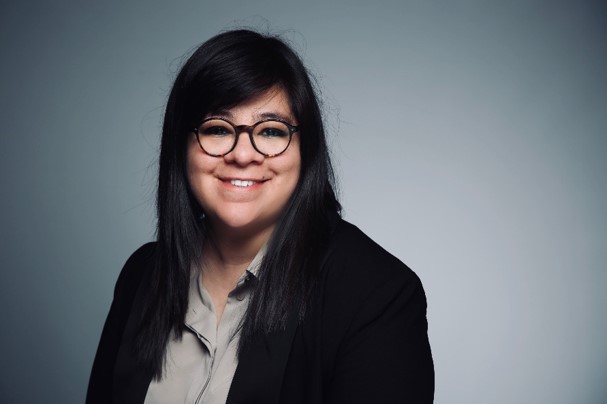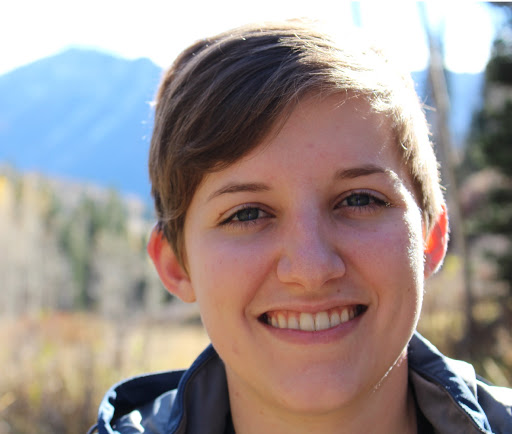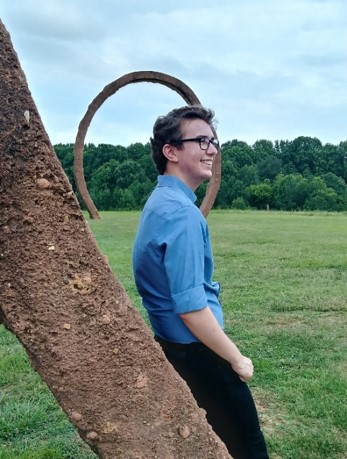The LGBTIQA+ Advocacy Awards recognize staff, faculty, and postdoctoral contributions, graduate and professional student contributions, and undergraduate contributions or advocacy on behalf of the LGBTIQA+ communities at the University of North Carolina at Chapel Hill. Individuals who have advocated on behalf of LGBTIQA+ individuals, conducted educational programming or research regarding LGBTIQA+ communities, helped to improve campus or community policies affecting LGBTIQA+ people, or enhanced visibility and awareness of LGBTIQA+ issues, all from an intersectional framework, were eligible for consideration.

Alejandra Márquez Guajardo
2019 Advocacy Award Recipient
Faculty, Staff, and Postdoc Award
The winner of this year’s faculty, staff, and postdoctoral scholar award was nominated by two esteemed colleagues who were consistently impressed by her achievements. She completed her Ph.D. in 2018 and is currently a Teaching Assistant Professor here at UNC. Her dissertation “Dissident Female Desire in Contemporary Mexican Literature and Culture” sets the foundation for the very first critical book-length work on lesbianism and its metaphors in Mexican today. In the past fifteen years, studies of male homosexuality in Mexican literature and culture have been extremely common, but the same cannot be said about scholarship focused on lesbianism. This recipient’s work has significantly contributed to the discipline by considering many literary genres that both problematize and contextualize lesbianism in this context.
However, her dedication to advocating for this community is not only evident in her most recent scholarly accomplishments. Starting as a graduate student, she served as a Safe Zone facilitator, a program focused on raising awareness of LGBTIQA+ issues on campus as well as creating a visible network of allies across offices, departments, and campus spaces. In 2014, this recipient participated in a panel for National Coming Out Day, a celebration of LGBTIQA+ people and their allies, and in Fall 2015, she organized a screening of the short film Disrupted/Quebranto for community members during Transgender Awareness Week. Her desire to bring people together for educational purposes has always been made apparent by her tireless dedication to highlight intersectional narratives in her advocacy work.
Connecting her campus advocacy work and her academic research, this recipient was also awarded a prestigious summer grant by the UNC Provost’s Committee on LGBTQ Life. This committee is charged with fostering high quality LGBTIQA+ experiences on campus as well as offering financial support for speakers, performers, and other innovative programs. This recipient’s work has extended into the broader Triangle area when she was invited to give a research presentation at Duke’s Center for Gender and Sexual Diversity. In that same year, she also shared her research on LGBTQ bookstores in Mexico with Dr. Michelle Robinson’s course LGTBQ Fiction and Film from 1950 to the Present in the American Studies Department here on campus. Her prolific success in sharing her research so early in her academic career is a positive omen for her forthcoming scholarship and further contributions to her discipline.
As a faculty member for the 2018-2019 school year, she taught several courses such as 1) Latin American and Latin@ Cultures and 2) Growing up Latin@, in which she regularly includes units on gender and dissident sexualities. Her students remark that she goes out of her way for them and makes learning as enjoyable as possible.

Leigh Spivey
2019 Advocacy Award Recipient
Graduate and Professional Student Award
The winner of this year’s graduate and professional student award was nominated by three colleagues and mentors who were passionate about highlighting the recipient’s contributions to the LGBTIQA+ community.
As a graduate student in the Clinical Psychology program at UNC-Chapel Hill, Leigh dedicated her research, clinical work, and internship hours to investigating the link between gender nonconformity and adolescent health risk behaviors. Her research pursues the factors that may help mitigate suicide risk among gender-nonconforming and transgender youth, a currently under researched area in her discipline. She has earned the great honor of receiving a fellowship from the National Science Foundation to study this topic and has already published half a dozen articles on LGBT youth and suicide, including her published “Future Directions” piece of affirming psychosocial approaches with trans youth. As a pioneering leader in this field creating innovative work with unmatched passion, continuation of this academic research will significantly improve the lives of LGBTIQA+ youth.
In addition, she is a fierce advocate for LGBTIQA+ students, staff, and faculty within the Clinical Psychology program. Years ago, the department of Psychology and Neuroscience created a self-assessment of the climate for minority undergraduate students. After learning LGBTIQA+ students had reported some concerns, she cofacilitated a focus group of psychology students to identify areas of growth within the department. Pursuing those actionable steps began to improve visibility and support structures for LGBTIQA+ students in psychology and neuroscience for years to come.
As made apparent by these efforts, Leigh routinely speaks up for marginalized voices with assertiveness and respect to peers and mentors alike. Due to her tact and expertise, she has been asked to present didactically to the entire Clinical Psychology faculty on relevant issues and considerations concerning transgender youth. Utilizing lecture, group exercises, and large discussion, she revolutionized the dialogue and understanding of gender-nonconformity within the department in a profound way. Her impact on the program’s climate has been immeasurable and she has since consulted with numerous labs, multiple community agencies, and even on the development of trans clinics in the Triangle area. She has helped reframe the dialogue about sexual and gender minority youth to ensure that all people understand the psychological symptoms as consistent with the minority stress theory, a framework that links the effects of discrimination on one’s health experiences. Her non-confrontational approach has uniquely taught those around her to reevaluation negative stereotypes regarding LGBTIQA+ status as a form of psychopathology.
Leigh is being recognized not only for her depth of knowledge, but also her kindness, compassion, and willingness to educate and provide outreach on behalf of gender non-confirming and transgender youth.

Morgan Korzik
2019 Advocacy Award Recipient
Undergraduate Student Award
Morgan serves as the Resident Assistant in Cobb Hall for the Pride Place community, a residential community focused on personal wellness and academic success of students of all sexual orientations, gender identities, and gender expressions here at UNC. He has been considered by his peers to be someone who has gone above and beyond in promoting the needs of LGBTIQA+ identified persons and allies, working to improve visibility, advocate for their needs, and empower community members. Under his leadership, the Pride Place community has been elevated to new heights as an available campus resource.
Morgan has served his students by holistically supporting them through experiences of discrimination and harassment that occurred on and around campus. His programming efforts have addressed interpersonal relationships, mental health resources, and other topics that have encouraged a climate of support and vulnerability in the residential community. He has also worked to connect Pride Place with other groups on campus, including the LGBTQ Center and the student-focused organizations SAGA (the Sexuality and Gender Alliance) and QTPOC (Queer and/or Trans People of Color). He has mobilized the residents of the community to further advocate for the visibility of these groups through such initiatives as chalking campus on Transgender Day of Visibility to empower and uplift others with powerful words written across campus.
In addition, Morgan spends much of his time researching and keeping current on news around LGBTIQA+ issues so that he can provide updated resources and support to those around him. When state laws were passed to prohibit gender-neutral bathrooms for students in the building, he provided support and advocated on behalf of his residents to find a solution. During many difficult conversations, he did not back down in his care and support for students while setting up meetings with senior leadership in Carolina Housing and the LGBTQ Center to ensure his students’ concerns were heard.
Outside of Pride Place, he has focused his energy on making sure that future Tarheels know about the LGBTIQA+ community on campus, volunteering at admitted students’ days, and tabling at summer orientation sessions. He previously hosted an event for community members from Pride Place to meet with students from local high schools through Durham Pride to talk about their college experiences.
2019 Advocacy Awards Committee
- Edward Bahnson
- Parker Brookie
- Jhon Cimmino
- Alli Whitenack
- Kyle Alexander
- Katie Bess Hilbinger
- Shelley Kennedy
- Montia Daniels
- Kimberly Pentel